The Old Curiosity Club discussion

This topic is about
Bleak House
Bleak House
>
Discussing the Novel as a whole
date newest »
newest »
 newest »
newest »
 What an amazing book this is!
What an amazing book this is! Characters I love: George and Phil, the Bagnets, Guppy, Charley
Characters I love to hate: Tulkinghorn, Hortense,
Krook, the Smallweeds (all in small doses, preferably)
Characters I just hate: Skimpole, Chadband
Tristram - or was it Peter? - suggested a future for Chesney Wold in the last thread: that Sir Leicester would die without an heir, and his family would then end up in Chancery, fighting over his estate. Sad, but quite fitting. I'm surprised Dickens didn't treat us to that, himself.
No one will be surprised to hear that my favorite scene is the old girl's birthday celebration. Even with Bucket's party crashing, it's such a warm, loving evening. I have no doubt that the same group gathered the following year, and that Bucket's duplicity was completely forgiven and forgotten.
I noticed that several of you named Caddy as a favorite character. I quite like Caddy, and she made me think about similar characters in other Dickens novels, namely Lizzie Hexam's friend, Jenny Wren, in Our Mutual Friend and Amy's friend, Maggy, in Little Dorrit. Jenny and Maggy both had afflictions - Jenny's physical, and Maggy's were, I believe, both physical and mental. Caddy's were emotional in nature. Interesting, though, that Dickens chose to make her child deaf. Are these "deficient" friends meant to further highlight the angelic perfection of our heroines? Did any other Dickens' heroines have friends with, shall we say, challenges? I can't remember Lucie Manette. Dolly Varden's friend Emma seemed practically perfect, except for that missing back-bone. But, of course, that made Dolly's spunk seem all the more spunky.
Now that we're done, I can't wait to spend a few days watching the BBC adaptation with Gillian Anderson. I've never seen the Diana Rigg version, which I think is on youtube, so perhaps I'll delve into both to see how they measure up to the book and each other.
 Mary Lou wrote: "Interesting, though, that Dickens chose to make her child deaf. Are these "deficient" friends meant to further highlight the angelic perfection of our heroines?"
Mary Lou wrote: "Interesting, though, that Dickens chose to make her child deaf. Are these "deficient" friends meant to further highlight the angelic perfection of our heroines?"I wonder if it's the opposite, since the child is named Esther. Esthers get born into affliction in this book. The main Esther's affliction is psychological; this new Esther's affliction is physical.
This brings up the puzzle of narrator-Esther's physical affliction, which is apparently important enough that we have to end the novel with it. As I mentioned earlier in the book, I don't know what to make of it. It seems extremely fuzzy to me whether she ends up, to be blunt, pox-marked--or not. There are definitely signs that she really is left physically changed by the illness, but also signs that she makes a full recovery from this--signs not only from besotted Woodcourt, but also even Guppy comes back to court her again. But I can't think of any medical explanation for why she would recover so fully and we don't ever get a firm answer on it--the novel ends with "even supposing--." so we are absolutely left hanging. The sentence isn't even finished.
Obviously there is something going on about true beauty is inside the person, not outside, but there are far less complicated and confusing ways to get that message across. So I wonder what to make of the end of the novel, especially in combination with baby-Esther's deafness. I wonder if Caddy's baby is supposed to feed somehow into communicating a message about what really counts as an affliction and what does not. For instance, Caddy's baby is clearly better off than baby Caddy was.
 Julie wrote: Esther's physical affliction, which is apparently important enough that we have to end the novel with it. --the novel ends with "even supposing--." so we are absolutely left hanging. The sentence isn't even finished. ..."
Julie wrote: Esther's physical affliction, which is apparently important enough that we have to end the novel with it. --the novel ends with "even supposing--." so we are absolutely left hanging. The sentence isn't even finished. ..."The ending! Thanks for remembering to bring up that little detail, lol! I don't know what to make of it, either, and I'd love to hear everyone's thoughts on this.
Bleak House is a remarkable novel. It’s always a war in my mind whether GE or BH is my favourite.
Let’s see my initial reactions:
Least favourite character. I’ll gladly pile on Skimpole. I’m not sure what he added to the novel. Humour? No. He is not funny. Perhaps in the hands of Oscar Wilde Skimpole could be made somewhat palatable, but he was a complete flop in BH.
Favourite Character: Caddy is wonderful. Boythorn is a delight. Lady Dedlock is an enigma. I wrestle with what makes her tick. In this reading with you all I have modified my dislike of Esther and now would classify her as acceptable. How’s that for vagueness?
Miss Flite is a delight. How could I not like a person who has such an affinity for birds. Finally, Sir Leicester. Yes, he is stuffy and too proud. Yes he is rather boring and too fully attached to the ruling classes. Nevertheless, there is something grand in him, something noble, something enduring. In my mind I believe that since Lady Dedlock’s death he has come to learn about her dark past. Still, with George as his guide, he remains faithful to her and her memory, just as George remains faithful to him.
I think people of honour and integrity are slowly fading from our world these days. Some would say we should bury and forget such remains. While I do not want to cling to such vestiges of the past it is comforting to know they still exist.
Let’s see my initial reactions:
Least favourite character. I’ll gladly pile on Skimpole. I’m not sure what he added to the novel. Humour? No. He is not funny. Perhaps in the hands of Oscar Wilde Skimpole could be made somewhat palatable, but he was a complete flop in BH.
Favourite Character: Caddy is wonderful. Boythorn is a delight. Lady Dedlock is an enigma. I wrestle with what makes her tick. In this reading with you all I have modified my dislike of Esther and now would classify her as acceptable. How’s that for vagueness?
Miss Flite is a delight. How could I not like a person who has such an affinity for birds. Finally, Sir Leicester. Yes, he is stuffy and too proud. Yes he is rather boring and too fully attached to the ruling classes. Nevertheless, there is something grand in him, something noble, something enduring. In my mind I believe that since Lady Dedlock’s death he has come to learn about her dark past. Still, with George as his guide, he remains faithful to her and her memory, just as George remains faithful to him.
I think people of honour and integrity are slowly fading from our world these days. Some would say we should bury and forget such remains. While I do not want to cling to such vestiges of the past it is comforting to know they still exist.
As for motifs, I found paper and words to be key components of the novel. From the vast hoardings of Krook, to the Court of Chancery, to the individual letters that weave themselves through the novel and into the lives of individual characters we find paper. Some mouldy, some with ink still fresh on its surface, some being swept up from the streets or seen plastering walls, there is paper everywhere.
And on that paper we find words. The written word is what attracts the attention of Lady Dedlock and thus initiates Tulkinghorn’s pursuit of Lady Dedlock. The written word on paper is what George possesses and so many others want for their own purposes or power. It is the written word that drives Lady Dedlock in disguise through the streets of London to find the resting place of Nemo. To his grave is where Lady Dedlock again goes when she flees Chesney Wold. At the gates of the graveyard Lady Dedlock is found dead by her daughter. All these events are initiated because of words on a piece of paper. Consider that the only time Esther is in the presence of both her parents occurs when she finds her mother dead and her father already buried steps away.
And words on paper. Well, to me, when Miss Flite’s birds are released and take flight we symbolically see the release of words into the world. Words that have been moulding for years and then partly burned in a fire, words that have been locked away by Mr George, words that have strangled the Court of Chancery are all now freed. Words once freed from the page become words that can enter one’s imagination; the words of Dickens on a page are now in our minds.
And on that paper we find words. The written word is what attracts the attention of Lady Dedlock and thus initiates Tulkinghorn’s pursuit of Lady Dedlock. The written word on paper is what George possesses and so many others want for their own purposes or power. It is the written word that drives Lady Dedlock in disguise through the streets of London to find the resting place of Nemo. To his grave is where Lady Dedlock again goes when she flees Chesney Wold. At the gates of the graveyard Lady Dedlock is found dead by her daughter. All these events are initiated because of words on a piece of paper. Consider that the only time Esther is in the presence of both her parents occurs when she finds her mother dead and her father already buried steps away.
And words on paper. Well, to me, when Miss Flite’s birds are released and take flight we symbolically see the release of words into the world. Words that have been moulding for years and then partly burned in a fire, words that have been locked away by Mr George, words that have strangled the Court of Chancery are all now freed. Words once freed from the page become words that can enter one’s imagination; the words of Dickens on a page are now in our minds.
 Peter wrote: "Nevertheless, there is something grand in him, something noble, something enduring...."
Peter wrote: "Nevertheless, there is something grand in him, something noble, something enduring...."Hear, hear! Well said, Peter.
Peter,
Your final words of your last post were absolutely spot-on! When you said that Bleak House is about how the written word affects people's lives I couldn't help thinking, "Wait a moment. The novel itself is written words, and they surely do hold me captivated and create a world of their own." Unlike the words the novel consists of and in, the words in the novel itself, however, are often used against people - for example when Captain Hawdon's originally harmless message is turned into a weapon by concentrating on the handwriting merely.
When thinking about the novel, I now think about words as double-edged swords - you may use them to present ultimate truths, as a novelist often does, but you may also use them to obfuscate truths, as a lawyer often does.
As to the last words of the novel, and the truth that may be hidden in it, I still have no real idea, Julie ;-)
Favourite character: Mr. Guppy - he's got his weaknesses, but for all that he is as good as his word. And it is his ambiguity which makes him so like a real person. I also loved the narrator's comment on Guppy as a man who plays chess when there is no opponent because I kind of found myself in that comment. I also liked Mr. Krook a lot because he was the perfect emblem of the legal system. - Like Peter, I was also fascinated with Sir Leicester, because under that shell of his there is a decent and human heart.
Character I loved to hate: Old Smallweed and Mr. Tulkinghorn.
Character I definitely hated - Skimmy, the most boring narcissist I have ever come across, and there are lots of boring narcissists in this world of ours.
Your final words of your last post were absolutely spot-on! When you said that Bleak House is about how the written word affects people's lives I couldn't help thinking, "Wait a moment. The novel itself is written words, and they surely do hold me captivated and create a world of their own." Unlike the words the novel consists of and in, the words in the novel itself, however, are often used against people - for example when Captain Hawdon's originally harmless message is turned into a weapon by concentrating on the handwriting merely.
When thinking about the novel, I now think about words as double-edged swords - you may use them to present ultimate truths, as a novelist often does, but you may also use them to obfuscate truths, as a lawyer often does.
As to the last words of the novel, and the truth that may be hidden in it, I still have no real idea, Julie ;-)
Favourite character: Mr. Guppy - he's got his weaknesses, but for all that he is as good as his word. And it is his ambiguity which makes him so like a real person. I also loved the narrator's comment on Guppy as a man who plays chess when there is no opponent because I kind of found myself in that comment. I also liked Mr. Krook a lot because he was the perfect emblem of the legal system. - Like Peter, I was also fascinated with Sir Leicester, because under that shell of his there is a decent and human heart.
Character I loved to hate: Old Smallweed and Mr. Tulkinghorn.
Character I definitely hated - Skimmy, the most boring narcissist I have ever come across, and there are lots of boring narcissists in this world of ours.
 Peter wrote: "I think people of honour and integrity are slowly fading from our world these days."
Peter wrote: "I think people of honour and integrity are slowly fading from our world these days."Do you really think so, Peter? I find reading these 19th century novels tends to make me feel the opposite: our era didn't invent scoundrels, or indifference to suffering, or people on the take for whatever they can get no matter the cost to others, or people too blind to notice what they're destroying.
It's not that I don't believe in progress (as a married woman, I wouldn't have been able to own property in Dickens's time), but I tend to think human nature is pretty constant. There are many people in my life I love and trust, and there are others I don't trust at all and then they end up surprising me by coming through when I didn't expect them to. I do see social trends that worry me, but as a teacher it means a lot to me to watch students about to dedicate themselves to fighting battles that need to be fought, and I see their hope as well.
 I wonder if we'd all love to hate Skimpole if he turned up in one chapter only. I think he was a great idea that Dickens simply overdid, maybe because it was an inside joke for his current audience who appreciated it more than we do.
I wonder if we'd all love to hate Skimpole if he turned up in one chapter only. I think he was a great idea that Dickens simply overdid, maybe because it was an inside joke for his current audience who appreciated it more than we do. I did not like Sir L starting out, but by the end he was one of my favorites, too.
I agree, Julie. As it is now, Skimpole might be the worst character ever, but if he had been in one or two chapters only he would have been great to hate, just like Old Mr. Turveydrop.
I think my favourite is still Miss Flite. I love Bucket, and George, and Sir Dedlock, and Boythorn, and Caddy. And I don't think I have even had them all.
I think my favourite is still Miss Flite. I love Bucket, and George, and Sir Dedlock, and Boythorn, and Caddy. And I don't think I have even had them all.
Least favorite scene Tristram? Other than any time Skimpole entered a room, it was the time Esther went to London, not for a year, or six months, or one month, or even one week, but for the day and coming home we're told:
They were so glad to see me when I got home, as they always were, that I could have sat down and cried for joy if that had not been a method of making myself disagreeable. Everybody in the house, from the lowest to the highest, showed me such a bright face of welcome, and spoke so cheerily, and was so happy to do anything for me, that I suppose there never was such a fortunate little creature in the world.
Oh, please.
They were so glad to see me when I got home, as they always were, that I could have sat down and cried for joy if that had not been a method of making myself disagreeable. Everybody in the house, from the lowest to the highest, showed me such a bright face of welcome, and spoke so cheerily, and was so happy to do anything for me, that I suppose there never was such a fortunate little creature in the world.
Oh, please.
As for least favorite/favorite characters, I'll do it in illustrations, just for you Peter. :-)
First there is:
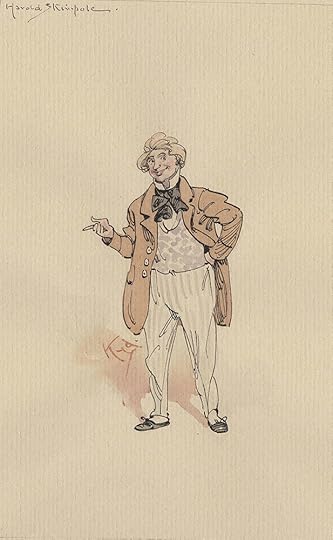
He could possibly be my least favorite child I ever met. Then there is an entire family:

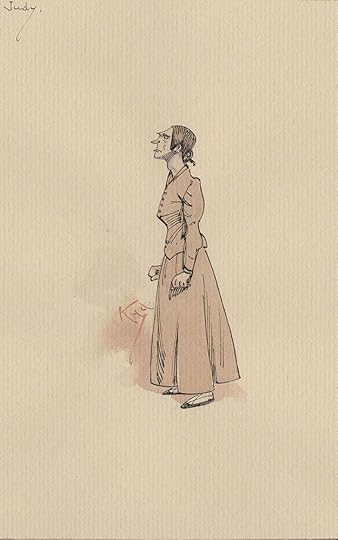
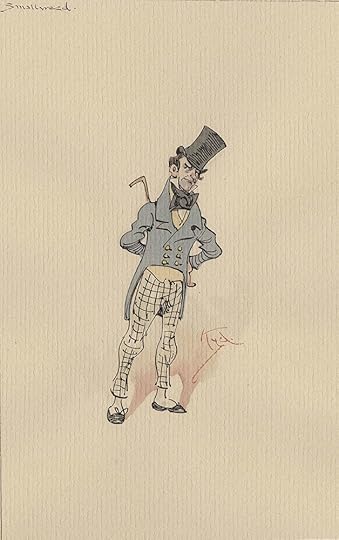
I take it back, I don't dislike Grandma Smallweed, I have no feelings for her one way or the other. Then there is:
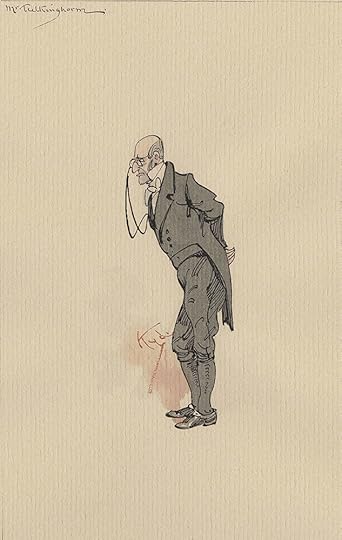
He spends his time torturing Lady Dedlock with the big secret that she must never tell, he couldn't let Lord Dedlock find out, then says he is going to tell him anyway. If he'd just be quiet Lady Dedlock may still be with us.
First there is:

He could possibly be my least favorite child I ever met. Then there is an entire family:



I take it back, I don't dislike Grandma Smallweed, I have no feelings for her one way or the other. Then there is:

He spends his time torturing Lady Dedlock with the big secret that she must never tell, he couldn't let Lord Dedlock find out, then says he is going to tell him anyway. If he'd just be quiet Lady Dedlock may still be with us.
As for favorites:
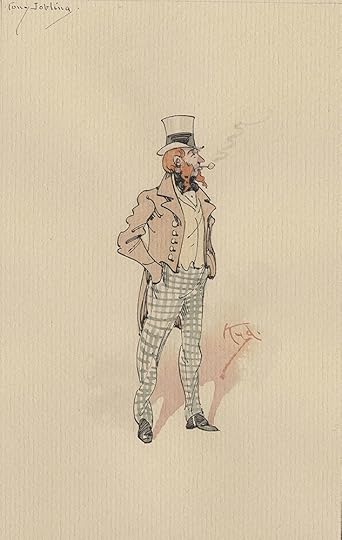
I wish we could have cut scenes with Skimpole and filled them with Tony Jobling. I can't find a Kyd illustration of Caddy, but she's on my list too.
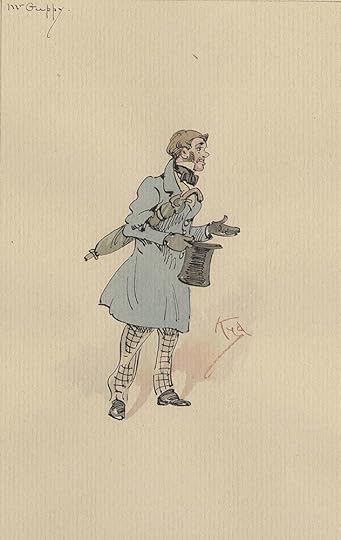
Poor Guppy, he tries so hard but things never seem to work out for him, and what a mother he has. For that matter mothers haven't turned out very well in BH. One of the best mothers you could want is:

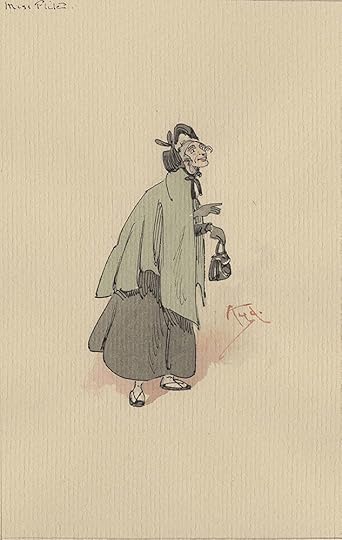
How could you not like Miss Flite?

I wish we could have cut scenes with Skimpole and filled them with Tony Jobling. I can't find a Kyd illustration of Caddy, but she's on my list too.

Poor Guppy, he tries so hard but things never seem to work out for him, and what a mother he has. For that matter mothers haven't turned out very well in BH. One of the best mothers you could want is:


How could you not like Miss Flite?
Kim wrote: "As for favorites:
I wish we could have cut scenes with Skimpole and filled them with Tony Jobling. I can't find a Kyd illustration of Caddy, but she's on my list too.
Poor Guppy, he tries so ..."
Yes Kim, you are right. Who could not like Miss Flite?
I keep waiting for the moment when I will see a Kyd illustration and say to myself “self, that illustration has some resemblance to what my mind’s eye has created for her/him.”
Alas, still waiting …
I wish we could have cut scenes with Skimpole and filled them with Tony Jobling. I can't find a Kyd illustration of Caddy, but she's on my list too.
Poor Guppy, he tries so ..."
Yes Kim, you are right. Who could not like Miss Flite?
I keep waiting for the moment when I will see a Kyd illustration and say to myself “self, that illustration has some resemblance to what my mind’s eye has created for her/him.”
Alas, still waiting …
 Before I had read this novel, I was always intrigued by the description and critical discussions (and biographies of Dickens) that it was the first “detective fiction” ever written. Before Bleak House, no one had ever written a novel that contained a mystery that had to be solved by a character within the book. Or at least a character in the role of a detective. So, Inspector Bucket’s dogged and observant ways did not disappoint.
Before I had read this novel, I was always intrigued by the description and critical discussions (and biographies of Dickens) that it was the first “detective fiction” ever written. Before Bleak House, no one had ever written a novel that contained a mystery that had to be solved by a character within the book. Or at least a character in the role of a detective. So, Inspector Bucket’s dogged and observant ways did not disappoint.
Kim wrote: "Least favorite scene Tristram? Other than any time Skimpole entered a room, it was the time Esther went to London, not for a year, or six months, or one month, or even one week, but for the day and..."
Yes, this absolutely overdone scene reminds me of a Laurel and Hardy short film called A Perfect Day (I think) where the two and their wives and their uncle Edgar prepare for a picnic. When they finally leave their street in their car - for a few hours -, they take an exuberant farewell from everyone in their street before their car finally sinks in a large puddle of mud.
Yes, this absolutely overdone scene reminds me of a Laurel and Hardy short film called A Perfect Day (I think) where the two and their wives and their uncle Edgar prepare for a picnic. When they finally leave their street in their car - for a few hours -, they take an exuberant farewell from everyone in their street before their car finally sinks in a large puddle of mud.
Peter wrote: "Kim wrote: "As for favorites:
I wish we could have cut scenes with Skimpole and filled them with Tony Jobling. I can't find a Kyd illustration of Caddy, but she's on my list too.
Poor Guppy, ..."
Yes, it was very tricky to figure out who the Kyd illustrations actually show. The easiest one was Grandfather Smallweed - don't ask me why ???
I wish we could have cut scenes with Skimpole and filled them with Tony Jobling. I can't find a Kyd illustration of Caddy, but she's on my list too.
Poor Guppy, ..."
Yes, it was very tricky to figure out who the Kyd illustrations actually show. The easiest one was Grandfather Smallweed - don't ask me why ???
John wrote: "Before I had read this novel, I was always intrigued by the description and critical discussions (and biographies of Dickens) that it was the first “detective fiction” ever written. Before Bleak Ho..."
Isn't it strange that no one had ever written a detective novel before? Now it seems like so obvious an idea.
Isn't it strange that no one had ever written a detective novel before? Now it seems like so obvious an idea.
 Tristram wrote: "John wrote: "Before I had read this novel, I was always intrigued by the description and critical discussions (and biographies of Dickens) that it was the first “detective fiction” ever written. Be..."
Tristram wrote: "John wrote: "Before I had read this novel, I was always intrigued by the description and critical discussions (and biographies of Dickens) that it was the first “detective fiction” ever written. Be..."Tristram, in some respects, I find that just astounding. And as usual with Dickens, the name Bucket aligns perfectly with the role and nature of the character. And I think the idea of mystery for Dickens successfully started with Bleak House and likely informed all of his later works.
 Kim wrote: "Least favorite scene Tristram? Other than any time Skimpole entered a room, it was the time Esther went to London, not for a year, or six months, or one month, or even one week, but for the day and..."
Kim wrote: "Least favorite scene Tristram? Other than any time Skimpole entered a room, it was the time Esther went to London, not for a year, or six months, or one month, or even one week, but for the day and..."My chuckle for the morning. Thanks for reminding me of this. It seems funny now... not so much during the actual reading of the book.
One of the many things I don't understand about Kyd, like how did he manage to make a living as an artist, or why do all his women look like men dressed as women, and ugly women at that, another is why does he chose the people to illustrate. In Bleak House we have characters such as:
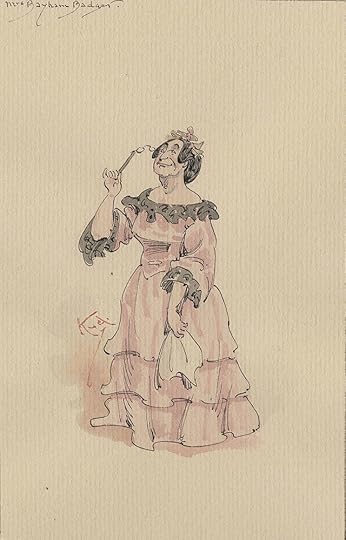
Mrs. Bayham Badger
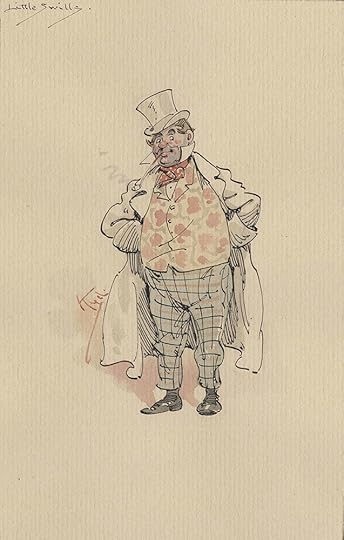
Little Swills
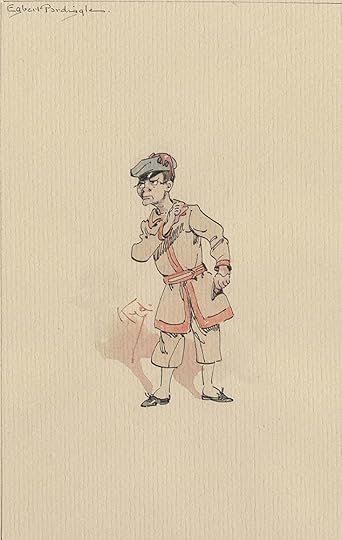
Egbert Pardiggle

And Mr. Quayle, there are none of Esther, Ada, or Caddy.

Mrs. Bayham Badger

Little Swills

Egbert Pardiggle

And Mr. Quayle, there are none of Esther, Ada, or Caddy.
 I had to look Swills and Quayle up. i suppose Kyd did the minor characters because everybody else was doing the Esthers and Skimpoles. Plus, he surely didn't want a comparison made.
I had to look Swills and Quayle up. i suppose Kyd did the minor characters because everybody else was doing the Esthers and Skimpoles. Plus, he surely didn't want a comparison made.
John wrote: "Tristram wrote: "John wrote: "Before I had read this novel, I was always intrigued by the description and critical discussions (and biographies of Dickens) that it was the first “detective fiction”..."
John,
From retrospect, it really seems incredible that the detective novel should not have been invented earlier, but then the novel itself was not really that old. I think they generally say that Don Quijote is the first novel, but in England the novel a bit younger than that. I don't know if I am right but I think that Daniel Defoe can be regarded as the first English novelist, and there are roughly 150 years between BH and Defoe.
Coming to think of it, if I had to write a novel, it would definitely be a mystery or a Gothic novel or one about a family feud - so, if I had been around in those days, I'd probably have invented the mystery novel a bit earlier ;-)
John,
From retrospect, it really seems incredible that the detective novel should not have been invented earlier, but then the novel itself was not really that old. I think they generally say that Don Quijote is the first novel, but in England the novel a bit younger than that. I don't know if I am right but I think that Daniel Defoe can be regarded as the first English novelist, and there are roughly 150 years between BH and Defoe.
Coming to think of it, if I had to write a novel, it would definitely be a mystery or a Gothic novel or one about a family feud - so, if I had been around in those days, I'd probably have invented the mystery novel a bit earlier ;-)






I have somewhat lost count as to what day it is today because in Germany there are always two Whitsun holidays, both the Sunday and the Monday. So, I am a little bit late with opening this thread, which is dedicated to discussing the novel as a whole.
Here you can write about ...
- your (least) favourite characters,
- your (least) favourite scenes,
- motifs that you noticed,
- in what way BH is different from earlier Dickens novels you read or in what way it stands for Dickens's development as an artist,
- or what you have always wanted to say with regard to our travels through Dickens's works,
- or anything else that comes to your mind.
You can also ask your own questions - feel free to share your thoughts with us!